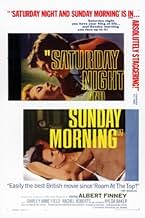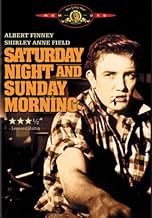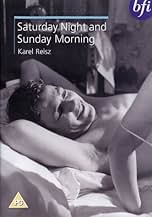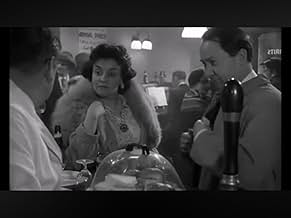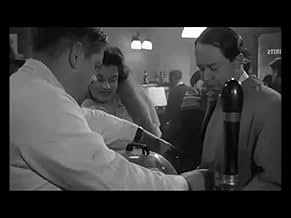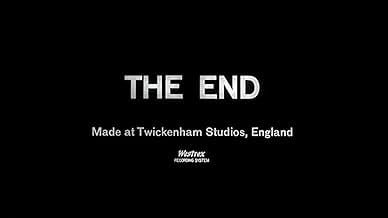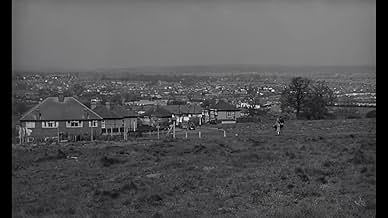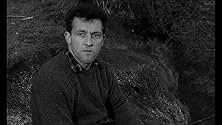Un operaio ribelle e che vive con fatica si destreggia tra i rapporti con due donne, una delle quali è sposata con un altro uomo ma incinta di suo figlio.Un operaio ribelle e che vive con fatica si destreggia tra i rapporti con due donne, una delle quali è sposata con un altro uomo ma incinta di suo figlio.Un operaio ribelle e che vive con fatica si destreggia tra i rapporti con due donne, una delle quali è sposata con un altro uomo ma incinta di suo figlio.
- Ha vinto 3 BAFTA Award
- 10 vittorie e 3 candidature totali
- Mrs. Seaton
- (as Elsie Wagstaffe)
- Loudmouth
- (as Colin Blakeley)
Recensioni in evidenza
Equally I knew that, on leaving, I would see his aunt (Hilda Baker) in the local chippy, and that Norman Rossington would be cycling to some nearby canal to fish. Indeed when Ben (my friend) and I left we went to our local for a quick pint and, I swear,we both had the uncanny feeling of being part of the film.
Time has passed and the working class East and West Midlands have change completely so it may not have such resonance for a new generation but if you want to know what a good slice of England looked and sounded like in the 1950s you should see it: it's better than any documentary. Indeed it is a great film.
The fact that it shocked audiences and local authorities because of its themes covering sex and abortion show that this was a time when a great deal of change was taking place in British society. Although I wasn't around then, things must have been changing very rapidly as six years later 'Alfie' was able to confront these issues full on whereas Karel Reisz's film merely hints at them.
This film also established Albert Finney as a national star and he was soon to become an international star with the wonderfully bawdy 'Tom Jones'. Its always interesting to see the films that established the actors we admire and I'm certainly a fan of Albert Finney so I was shocked when I saw this film and felt that he wasn't really very good in it.
The opening scene where his character, Arthur Seaton, is counting the parts he is making in his factory seemed to introduce a highly overwrought man that shouted all the time. Thankfully the unnecessary 'anger' at the start was toned down later but I still felt at the end that Finney could have done greater justice to his role.
Walking around with a straight back and his chest out, talking twice as loud as he needs to seemed to resemble an angry old man rather than an angry young man and I almost expected him to talk about how kids nowadays didn't know they were born.
Its unusual that an actor from a working class background didn't convince me when playing a character that was not that dissimilar from himself whilst actors like Tom Courtenay in 'Loneliness...' and particularly Richard Harris in 'This Sporting Life' did it much better.
However, I gradually found myself being more and more absorbed in this film as it started to develop a storyline and move away from a young man being angry simply for the sake of it.
Rachel Roberts excels in her role as the married woman who becomes pregnant by Seaton and its a shame that this actress has been forgotten when you consider her performance here and the marvellous one she gave opposite Harris in 'This Sporting Life'.
Shirley Anne Field also does well as Doreen the girl looking to settle down and it is in her relationship with Seaton where I disagree with many people's assessment of the film.
Its generally said that Seaton hates the idea of conformity but in the end accepts it. However I feel that the film is much more hopeful than that as he realises that love and marriage is not necessarily a trap that only fools rush into and that there is much more to conventional life than he had originally anticipated.
This film was considered quite shocking at the time of its release because of its frank sexual situations and the freely-discussed topic of abortion. These themes aren't shocking anymore, but one reason for that is the introduction of them in films like this. Shot in black and white, it gives the viewer a picture of life in a bleak factory town, portrayed very realistically by director Karl Reisz. The actors are these people, they're not merely playing them. This is especially true of Finney, who sports a low-class accent and epitomizes the "angry young man" so prevalent in the late '50s. Finney's performance as a young man who takes out his work-week aggression on women, booze and mischief, is as revolutionary as Dean's or Brando's was in American cinema.
Finney is ably backed up by the supporting actors. Roberts is very effective as Brenda, a housewife married to a dull man, and Shirley Anne Field even dressed down is gorgeous as the ingénue who wins Arthur's heart and makes him look at the future. One wonders if he'll ever grow up sufficiently. She's going to have her hands full.
The dialect is very authentic and difficult to understand at times - I actually used my closed captioning. The dialect adds to the whole atmosphere of "Saturday Night and Sunday Morning," another of the rebel movies but in a class all by itself.
In the theater, this revolt took the form of the "kitchen sink drama" and the era of the Angry Young Men In the movie industry, it was the era of "Free Cinema," an attempt by young filmmakers to break away from established subjects and standard treatments
This raw melodrama deals with Arthur Seaton (Finney), a working class young man who rejects the misery and grind of his home and factory, but whose only possible rebellion takes the form of a cynicism towards authority and a cheerful indulgence in sexual encounters with various ladies of the town His rebellion, though limited, is nevertheless genuine and the film's situation in a working class milieu is, for the habitually middle and upper class conscious British cinema, a much needed step forward...
Lo sapevi?
- QuizThe factory scenes were filmed in the same factory that original author Alan Sillitoe worked in during the war when he was making shells and other artillery. At the time of filming, the factory was owned by the Raleigh bicycle company.
- BlooperWhen Arthur and Doreen meet for the first time, her packets of crisps on the counter disappear and reappear between shots.
- Citazioni
Arthur Seaton: Mam called me barmy when I told her I fell of a gasometer for a bet. But I'm not barmy, I'm a fighting pit prop that wants a pint of beer, that's me. But if any knowing bastard says that's me I'll tell them I'm a dynamite dealer waiting to blow the factory to kingdom come. I'm me and nobody else. Whatever people say I am, that's what I'm not because they don't know a bloody thing about me! God knows what I am.
- ConnessioniFeatured in Viewpoint: We the Violent: Part 1 (1961)
I più visti
- How long is Saturday Night and Sunday Morning?Powered by Alexa
Dettagli
- Data di uscita
- Paese di origine
- Lingua
- Celebre anche come
- Todo comienza el sabado
- Luoghi delle riprese
- Azienda produttrice
- Vedi altri crediti dell’azienda su IMDbPro
Botteghino
- Budget
- 100.000 £ (previsto)
- Lordo in tutto il mondo
- 370 USD
- Tempo di esecuzione1 ora 29 minuti
- Colore
- Proporzioni
- 1.66 : 1
Contribuisci a questa pagina



